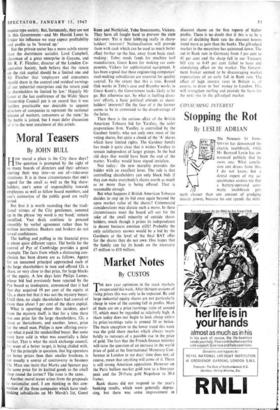Moral Teasers
By JOHN BULL How moral a place is the City these days? The question is prompted by the sight of so many boards of directors and their advisers steering their way into—or out of—take-over situations. It is in these circumstances that one's regard for the small as well as the big share- holders, one's sense of responsibility towards employees as well as fellow board members, and one's estimation of the public good are really tested.
But first it is worth recording that the tradi- tional virtues of the City gentlemen, summed up in the phrase 'my word is my bond,' remain unsullied. Vast deals continue to proceed smoothly by verbal agreement rather than by written instruction. Bankers and brokers do not reveal confidences.
The huffing and puffing in the financial press is about quite different topics. The- battle for the control of Pye of Cambridge provides a good example. The facts from which a distressing con- clusion has been drawn are as follows. .Agents for an unnamed principal approached each of the large shareholders in turn and offered 12s. a share, or very close to that price, for large blocks of the equity. A few days later Philips Lamps, whose bid had previously been rejected by the Pye board as inadequate, announced that it had that day acquired 19 per cent of the equity at I2s. a share but that it was not the mystery buyer. Until then, no single shareholders had control of more than about 5 per cent of the share capital.
What is upsetting about this incident, apart from the mystery itself, is that for a time there was one price for the large shareholders, 12s. a share or thereabouts, and another, lower, price for the small man. Philips is now offering every- one what it paid the unidentified buyer. But some must have sold in what was essentially a false market. That is what the stock exchange council, for want of a better target, is being chided with.
Yet the principle in question, that big operators get better prices than their smaller brethren, is not usually a source of controversy in business Ilfe. Must one insist that Marks and Spencer pay the same price for its knitted goods as the small -hop round the corner? The issue is the same.
Another moral teaser arises from the proposals to nationalise steel. I am thinking in this con- nection of the three companies which have steel- making subsidiaries on Mr Marsh's list, Guest Keen and Nettlefold, Tube Investments, Vickers. They have all fought hard to prevent the state take-over. Yet is their lobbying really in share- holders' interests? Nationalisation will provide them with cash which can be used to much better effect further up the line, away from basic steel- making: Tubes needs funds for machine tool manufacture, Guest Keen for making car com- ponents, Vickers for sophisticated equipment. It has been argued that these engineering companies' steel-making subsidiaries are essential for quality control. To the extent that this is true, Round Oak works in Tube's case and Brymbo works in Guest Keen's, the Government looks likely to let go. But otherwise not. So what is fuelling direc- tors' efforts, a basic political attitude or share- holders' interests? On the face of it the former seems to be in command to the disadvantage of the latter.
Then there is the curious affair of the British American Tobacco bid for Yardley, the toilet preparations firm. Yardley is controlled by the Gardner family, who not only own most of the voting shares, but quite a chunk of the 'A' shares which have limited rights. The Gardner family has made it quite clear that it wishes Yardley to remain independent of larger groups. In the bad old days that would have been the end of the matter. Yardley would have stayed inviolate.
Not today: the new morality provides the bidder with an excellent lever. The rule is that controlling shareholders can only block bids if they can make everybody's shares worth as much as or more than is being offered. That is reasonable enough.
But what happens if British American Tobacco decides to step up its bid once again beyond the open market value of the shares? Commercial considerations may dictate such a move. In these circumstances must the board sell out for the sake of the small minority of outside share- holders, much though it prizes its independence (a decent business emotion still)? Probably the only satisfactory answer would be a bid by the Gardners at the level of the final BAT offer for the shares they do not own. One hopes that the family can lay its hands on the necessary £7 million to £10 million.






























 Previous page
Previous page